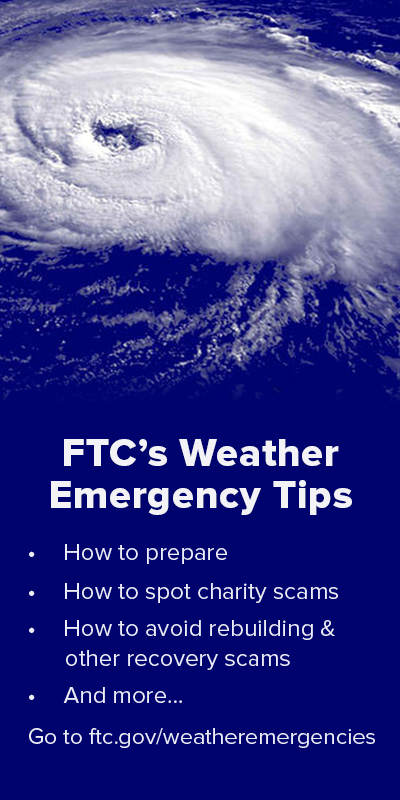 As Hurricane Irma bears down on Florida and possibly other states, the Federal Trade Commission has information to help you prepare for, deal with, and recover from the long-term impacts of a weather emergency, including these basics:
As Hurricane Irma bears down on Florida and possibly other states, the Federal Trade Commission has information to help you prepare for, deal with, and recover from the long-term impacts of a weather emergency, including these basics:
- Have your financial documents up-to-date, accessible, and portable.
- Find out if your home, health, or other insurance policy will pay for temporary shelter, replacement clothing, furniture, or other items.
- Plan for your pets.
For more tips and information, visit:
- Ready.gov
- FEMA’s Community and Family Preparedness Program and download the FEMA Smartphone App
- American Red Cross Community Disaster Education and download Red Cross Mobile Apps
Be alert to charity scams. Urgent appeals for donations may not be on the up-and-up. Check out the charity with the Better Business Bureau's (BBB) Wise Giving Alliance, Charity Navigator, Charity Watch, or GuideStar. These organizations provide lists of charities they have screened that are raising funds for specific causes, like Hurricane Harvey or Irma relief assistance.
- Never click on links or open attachments in e-mails unless you know who sent it. You could unknowingly install malware on your computer.
- Don’t assume that charity messages posted on social media are legitimate. Research the organization yourself.
- Find out if the charity or fundraiser must be registered in your state by contacting the National Association of State Charity Officials. If they should be registered, but they're not, consider donating through another charity.
- Check out the Federal Emergency Management Agency’s (FEMA) volunteer and donation page. It outlines the best ways you can help people and communities who are impacted by a disaster.
- Designate the disaster so you can ensure your funds are going to disaster relief, rather than a general fund.
- Give directly rather than through a paid fundraiser. Professional fundraisers get a percentage of your donation, sometimes 50 percent or more.
- When texting to donate, confirm the number with the source before you donate. The charge will show up on your mobile phone bill, but donations are not immediate.
Once the storm has passed, these tips and links to resources can help ease the difficult tasks of recovery:
- Contact your insurance company. Ask what the next steps are in assessing any damage to your home or business.
- The FTC and the Red Cross have advice on how to cope if your home is flooded.
- Be skeptical of people promising immediate clean-up and debris removal. Some may demand payment up-front for work they never do, quote outrageous prices, or simply lack the skills, licenses, and insurance to legally do the work.
- If you’re looking for a place to rent during recovery, be cautious of rental listing scams. Scammers often advertise rentals that don’t exist to trick people into sending money before they find out the truth.
- Many people will be asking for your personal information. Make sure you know who you are dealing with. Ask for identification before you share your Social Security or account numbers. Scammers sometimes pose as government officials, and ask for your financial information or money to apply for aid that you can request on your own for free. Government officials will never ask you for money in exchange for information or the promise of a check.
- You might have had to leave your home without IDs, checks, credit and debit cards, and other documents. You also might be without access to a bank account or paycheck for some time. If you need to get money, understand your options for paying bills and replacing important documents. This list of contacts may help you regain your financial footing.
- Call your creditors and ask for help. If your home is uninhabitable, contact your lender to discuss the options you have with regard to your mortgage.
The Federal Trade Commission works to promote competition, and protect and educate consumers. You can learn more about consumer topics and file a consumer complaint online or by calling 1-877-FTC-HELP (382-4357). Like the FTC on Facebook, follow us on Twitter, read our blogs and subscribe to press releases for the latest FTC news and resources.
Contact Information
MEDIA CONTACT:
Office of Public Affairs
202-326-2180
